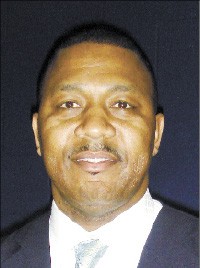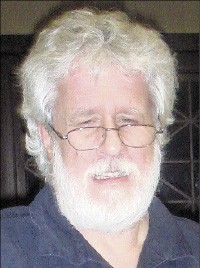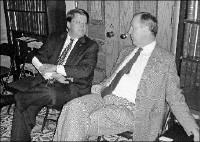A few weeks ago, Keith Norman, matched against rival candidate Jay Bailey, seemed a good bet to become the next chairman of the Shelby County Democratic Party.
His public boosters included both Shelby County commissioner Sidney Chism, the former Teamster leader and ex-party chairman who leads one of the major party factions, and Desi Franklin, a leader of the Mid-South Democrats in Action, a reformist group that came on the local political scene in the wake of the 2004 presidential campaign.
The combination of Chism’s supporters and the MSDIA group (abetted by members of Democracy in Memphis, an outgrowth of the erstwhile Howard Dean movement) was enough to put Matt Kuhn over as party chairman in 2005. At the time, Kuhn, a youthful political operative and veteran of numerous campaigns, was regarded as a compromise “third-force” choice — a break from the back-and-forth pendulum swings between the party’s “Ford faction” and Chism’s group, loyal, more or less, to Mayor Willie Herenton.
 Jackson Baker
Jackson Baker
Keith Norman
To be sure, local Democrats are disputatious (maybe we should say “free-minded”) enough to do justice to 20th-century humorist Will Rogers’ line, “I’m not a member of an organized political party; I’m a Democrat.” Their loyalties are not so hard and fast as to be confined permanently to one bloc or another.
Lawyer Bailey, son of former longtime county commissioner Walter Bailey, had a span of his own, ranging from members of the old Ford faction to party loyalists grateful for his legal representation of several defeated Democratic candidates who challenged the results of last year’s countywide elections.
Even so, depending on how the delegate-selection process from the party’s March 3rd caucus actually sorted out, the Chism-Franklin arithmetic was regarded in many quarters as good enough to give Norman, a Baptist minister, the advantage in the forthcoming local Democratic convention, to be held on Saturday, March 31st.
This impression was bolstered by Norman’s speaking appearance late last month at a meeting of the MSDIA — one that was attended by curious party members from various factions.
At that event, Norman spoke eloquently and persuasively (as befits someone long used to dealing with a large congregation, in his case, the First Baptist Church on Broad Street). He proclaimed a “big tent” philosophy in which a variety of viewpoints would be welcomed within the party, talked turkey on matters of fund-raising, Get-Out-the-Vote efforts, and managed to skirt potentially divisive issues like abortion and gay rights.
Though Bailey is a trial lawyer with ample rhetorical skills of his own, it seemed obvious to attendees at the MSDIA meeting that Norman, a towering but good-natured presence, would be a hard man to match up to, one-on-one. It seemed clear, too — both from Norman’s presentation and from testimonials paid him by various Democratic luminaries and activists — that his appeal could be wide enough to transcend factional differences.
 Jackson Baker
Jackson Baker
Richard Fields
Ninth District congressman Steve Cohen passed along his compliments, and even David Upton, a longtime Bailey associate and backer, had good things to say about Norman.
Some of his professed supporters, however, may have done him more harm than good.
The Fields Case (Continued)
There was the strange case of attorney Richard Fields, who in recent election years has comported himself in the manner of a would-be kingmaker. In fairness, Fields probably sees himself as some kind of public ombudsman, overseeing the political process in the interests of the people.
In any event, Fields made a big splash during the 2006 countywide election process, composing open letters about the attributes, positive and negative, of various candidates. His widely distributed observations on judicial candidates in particular were regarded as having had palpable effect in the election results.
Fields, however, was not universally accepted as an unbiased observer. Some African-American observers — notably blogger Thaddeus Matthews — argued that Fields was bolstering mainly white, establishment-supported candidates and selectively bashing independent-minded blacks.
The very charge, true or not, was ironic, given Fields’ background as a civil rights attorney, his marriages to black women, and the biracial nature of his several children.
In truth, Fields supported both whites and blacks and Democrats as well as Republicans, though Matthews and others, notably attorney Robert Spence, saw him as having hedged his endorsements, even changing several, in order to create a false appearance of objectivity.
As chronicled in a previous column (“The Fields Case,” February 1st issue), two white candidates for General Sessions judgeships — Janet Shipman and Regina Morrison Newman — saw their promised endorsements belatedly withdrawn by Fields in favor of equally qualified black candidates, Lee Coffee and Deborah Henderson, respectively.
Coffee and Henderson, who, among their other important endorsements, had that of the Shelby County Republican Party, both won, and Shipman and
Newman each later agreed with Spence’s assessment that they had fallen victim to Fields’ need to do some old-fashioned ticket-balancing.
Spence himself had serious arguments with erstwhile supporter Fields during his service some years ago as city attorney and later made unspecified charges that Fields had tried to extort unwarranted favors from him.
 Jackson Baker
Jackson Baker
Legislative Leaders: West Tennessee may have lost some clout in the Tennessee General Assembly, but not Shelby County, which boasts both party leaders in the Senate. Here Mark Norris (left), Republican majority leader, and Jim Kyle, Democratic leader, mull over a compromise on medical tort reform.
When Spence became a candidate in the special Democratic primary to fill a state Senate vacancy early this year, Fields materialized yet again as a public scold, sending out an advisory letter warning voters of what he saw as Spence’s derelictions as city attorney. Spence lost to fellow Democrat Beverly Marrero, who also won the general election last week to succeed Cohen (and interim fill-in senator Shea Flinn) as state senator from District 30.
In any case, Fields’ ad hoc career as commentator on elections and would-be arbiter of candidacies was already well-launched when he rose during the last several minutes of Norman’s meeting with MSDIA members to make a point of revealing his own support of the minister, announcing, in fact, that he had “vetted” Norman’s candidacy beforehand.
That statement, together with Norman’s own wry revelation that Fields had made several telephone calls to him that day to make sure he would be in attendance at the MSDIA event, created an impression, right or wrong, that Fields was a prime mover in the Norman candidacy.
Confusion in the Ranks
Reaction to Fields’ intervention was virtually immediate. This was, after all, no judicial election for which Fields, as a longtime practicing attorney, could be thought of as supplying a pure, even-handed evaluation of credentials. This was the most partisan of all possible partisan matters — the selection of a party leader — and Fields was not exactly the ideal endorser.
He had, after all, been forced to resign last year as a member of the very Democratic committee that will have to decide on a new chairman. His offense? Pooling his legal efforts with those of the state Republican Party to overturn the 2005 special election victory of Democrat Ophelia Ford for reasons of possible election fraud committed on her behalf.
No one on the committee quarreled with Fields’ right to seek that legal end — just not as a member of the Democratic committee. (Ford’s election was, in fact, ultimately voided by the state Senate, though she won election to the seat overwhelmingly in last year’s regular election.)
Several rank-and-file Democrats expressed open displeasure concerning Fields’ involvement in the chairmanship race, and blogger Matthews would later report that Norman, when asked about it, “denounced” Fields as a potential supporter. Asked about that this week, Norman declined comment. He also would neither confirm nor deny that he had distanced himself, as reported by Matthews, from Chism’s support.
For obvious reasons, all of this fuss caused some rethinking about Norman’s inevitability as a chairman. The pastor himself would say only that he preferred to speak of “principles” rather than personalities, that he wanted to avoid immersion in factional disputes, that he had no wish to be judgmental, and that he had resolved to keep his own efforts “on higher ground.”
Last week saw the resolution of two political mini-dramas with the special-election victories of Democrats Marrero and G.A. Hardaway for state Senate and state House positions, respectively. (New District 92 representative Hardaway, a longtime campaigner for father’s-rights legislation in child-custody cases, will presumably bring with him his continued dedication to that cause.)
One other piece of news from the week (actually late last week): Shelby County Election Commission chairman Greg Duckett was named to the state Election Commission — which means that a new member will shortly be named to the county Election Commission.
Whoops! Here comes another political drama — maybe not so mini. The fact is, the local commission is facing not a single routine replacement but something resembling a total makeover — at least of its three-member Democratic Party contingent.
The commission as a whole has come under frequent challenge during the past year for alleged derelictions in supervising elections, and, while the commission’s two Republicans, Rich Holden and Nancye Hines, appear to have escaped their partymates’ wrath and seem assured of a safe return, the remaining Democrats are at risk.
As Senate Democratic leader Jim Kyle, a member of the Shelby County legislative delegation that will resolve the issue, put it on Thursday: “I wouldn’t be surprised if either Maura [Sullivan] or O.C. [Pleasant] went off, too. In fact, I wouldn’t be surprised if they both did.”
A total swap-out for the Election Commission’s Democrats? Other legislators from Shelby County — like delegation chairman Joe Towns, who personally took no position on the prospect of a complete makeover — said they’d heard similar conjectures.
The list of Democratic applicants for one, two, or three positions include the two party holdovers, Sullivan and Pleasant, and several other well-known local Democrats, including former commissioner Myra Stiles’ recent countywide candidates Coleman Thompson, Shep Wilbun, and Sondra Becton and local AFSCME leader Dorothy Crook.
Some measure of Democrats’ discontent with the status quo on the commission can be gleaned from the fact that Suzanne Darnell, representing the local Democratic executive committee’s task force on the election process, has requested a meeting with Election Commission members and staff to discuss 14 separate points of misgiving concerning the way elections went last year.
The points ranged from doubts concerning election hardware and software to questions concerning the commission’s oversight and the fact that the post of deputy commission director continues to go unfilled. The late Barbara Lawing, a longtime Democratic activist and proponent of civil rights and feminist issues, will be the only posthumous recipient of the seven Women of Achievement awards that will be given Sunday at 4 p.m., at the University of Memphis-area Holiday Inn as part of National Women’s History Month. Other recipients will be the Rev. Rebekah Jordan, Donna Fortson, Nancy Lawhead, Gertrude Purdue, Modeane Thompson, and Sheila White.
 Jackson Baker
Jackson Baker  Jackson Baker
Jackson Baker  Jackson Baker
Jackson Baker  JB
JB 